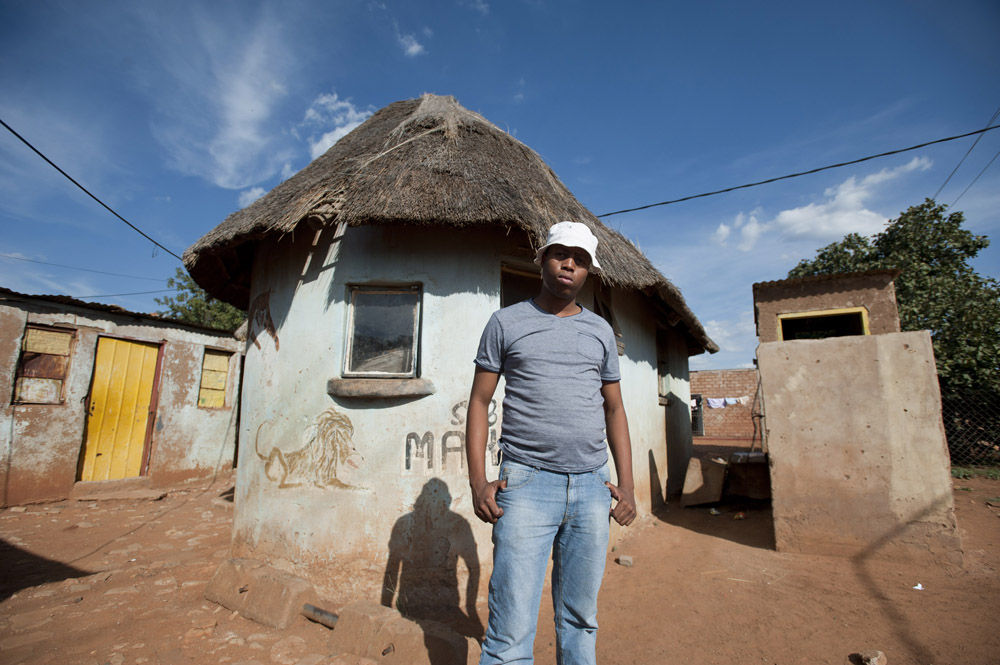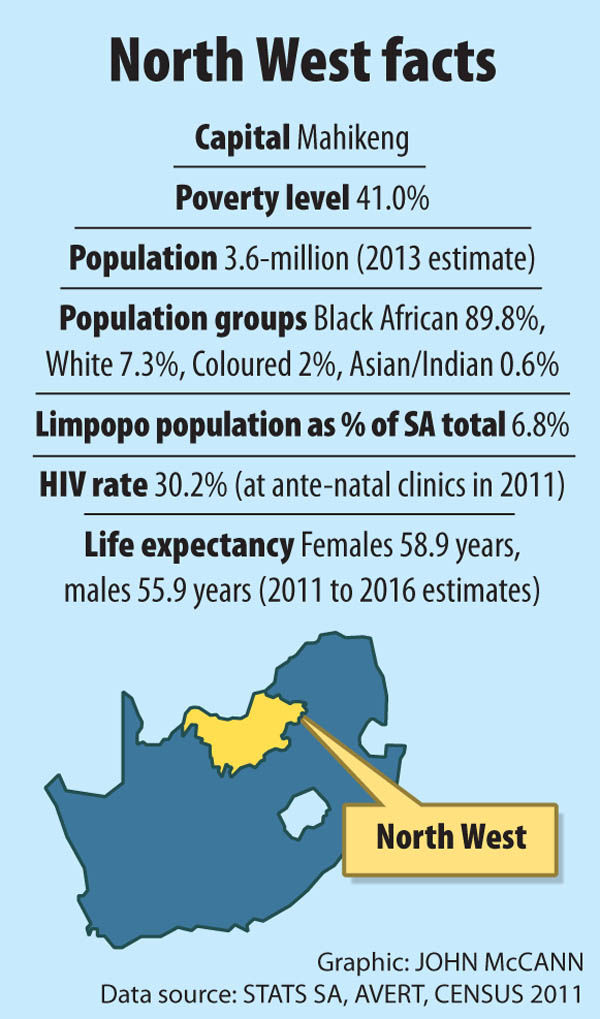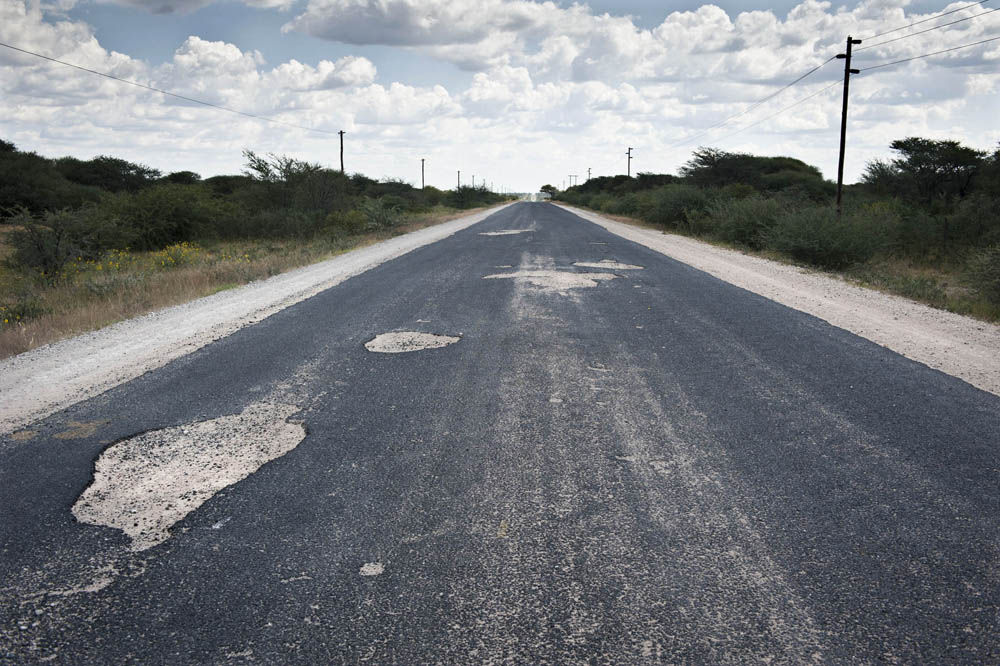Orapeleng Khula is still waiting for an RDP house in Rooigrond
It is young people such as Brian Thekiso (28) of Khuma township in Klerksdorp who are likely to return the ANC to power next month. Despite debilitating factionalism, endemic corruption, poor service delivery and massive youth unemployment the party is set to triumph yet again in the North West.
Thekiso is unemployed and shares his late parents' two-bedroomed house with his sister Bathabile and her children. They are part of a 10-member family that depends on social grants that work out to about R2 500 a month.
But the Thekisos are grateful.
"There are some positive changes in my community," said Thekiso. "Everyone has electricity whereas in 1994 we did not have. There are a lot of RDP houses that have been built for people, we have water and my township has two libraries."
Almost half (802 832) of the people registered to vote in the North West are between the ages of 18 and 39 and their main source of unhappiness is unemployment.
Unemployed
No one in Thekiso's family has a job. When he secured a learnership with the Dr Kenneth Kaunda district municipality, it was later found that the service provider the municipality contracted to run the skills programme was not accredited. Brian has no certificate to show for the skills he was trained in, making it difficult to get a job. His complaint to the presidential hotline only got him a reference number that he has held on to since 2010.
"All these mines are closed down and the expanded public works programme (EPWP) doesn't create decent jobs. It's frustrating as a young person to find myself in this situation. You ask yourself why you should vote," said Thekiso.

Brian Thekiso and his sister Bathabile stay in Khuma, Klerksdorp with six kids.
They will be voting ANC.
But he will vote on May 7 and he'll choose the ANC, as he has done since he started voting in 2004.
"I still have hope in the ANC. When the [party] leadership changes in 2017 things will improve, and not just one person, I mean the entire ANC leadership."
Rooigrond, a poverty-stricken village 10km from Mahikeng, is one of the ANC's strongholds, despite residents there having fought the Mahikeng local municipality for seven years over threats to evict them from the land. But the ruling party has secured forgiveness, residents said.
Improvement
Orapeleng Khula (37), one of the community leaders, said that having the municipality regularly deliver water in Jojo tanks, together with a mobile clinic and a social worker who visits once a month, is an improvement from having no services at all.
The government has also employed 42 young people through a 12-month EPWP contract to clean a police station and a school, and to cut grass.
"Emotionally I am satisfied," Khula said. "We still live in shacks since 1994, but I know a lot of people who live in free houses elsewhere. We expect that our houses will also be built by the end of next year."

The biggest employer in the North West is the government, something the ANC says it is trying to discourage. "It should not be that way," provincial chairperson Supra Mahumapelo told the Mail & Guardian this week. "This is why we want the private sector in the province to grow."
North West accounts for 6% of South Africa's gross domestic product, with mining, agriculture and manufacturing contributing the largest portion. Unemployment in the province is slightly more than 26%, and 41% of the population live in poverty, according to statistics released by the province last week.
Sceptical voter
Sceptical about opposition parties, Bathabile Thekiso, like her brother Brian, will stick with the ANC.
"My children go to school for free and receive a meal for lunch. If it wasn't free some of these children would not be going to school. We have got RDP houses and we receive grants," she said. "The ANC did nothing wrong; the problem is with its deployees who do as they please."
The ANC has been hard at work putting out fires – literally and figuratively – in places such as Bloemhof, where six houses were torched this week, and Bodibe outside Lichtenburg, where residents blocked the road and stoned vehicles.

The road to Mahikeng is a nightmare to navigate. (Photos: Madelene Cronjé, M&G)
The killing of 34 striking Marikana mineworkers has turned the North West's mining area into an attractive political platform. Although the anger directed at the ANC-led government has seen the party struggling to hold big electoral rallies on the platinum belt in particular, smaller opposition parties have seen an opportunity to explore that part of the North West.
The Economic Freedom Fighters appears to be the stronger party here. "Our projection is that we will get 40% of the vote," said EFF co-ordinator Papiki Babuile.
By failing to deliver services, the ANC was "donating members" to the new party, Babuile said.
But this does not seem to be threatening the ANC's hold on the province. Bathabile Thekiso sums it all up: "Maybe the time will come when we say we are fed up with the ANC. That time has not yet arrived."
Squabbles sap ANC support, but it will still get the most votes
The North West is notorious for the factional battles that regularly torment the ANC in the province. These factions have existed for as long as it has led South Africa.
For many citizens of the province, the bigger issues are an inadequate water supply, poverty, poor road infrastructure and unemployment.
Yet, come election time, the ANC sails through, despite the party often being blamed for its failure to deliver on its election promises. The ANC got 73% of the vote in the last election (2009), a decline from the 81% it got in 2004, and 80% in 1999. That 21 000 people spoiled their votes in 2009 is a sign of frustration with the lack of a credible alternative political party in the province.
The Congress of the People (Cope), then a new party after its leaders dumped the ANC, managed only 8%, to become the province's official opposition party, followed by the Democratic Alliance (DA).
In the first democratic election in 1994 the ANC received 1.3-million votes in the province, securing 26 seats in the provincial legislature. An Ipsos survey predicts that the ANC's support in the North West could fall to as low as 63% on May 7. The ANC blamed a low voter turnout for the drop in the votes it received in 2009.
ANC provincial chairperson Supra Mahumapelo said this is why the party has been crisscrossing the province since last month to urge people to cast their votes.
"There was also a lot of disgruntlement with ANC politics," he said. "Now we are more stable."
But the ANC in North West is regularly distracted by internal squabbles, which always spill into the government. All the province's 24 local municipalities and four district municipalities are struggling to manage their finances. None of them received a clean audit for the 2011-2012 financial year. Cronyism, maladministration and corruption always spark disgruntlement and violent protests.
It is one of the provinces that has provided a fertile ground for Julius Malema's Economic Freedom Fighters (EFF); the new party appears to be heading for a good performance in the elections.
An Ipsos "Pulse of the People" survey predicts that the EFF could be the official opposition in North West after the election, toppling Cope. The survey forecasts a 12.7% vote for the party, more than any other official opposition in the province has received. The United Christian Democratic Party of former Bophuthatswana leader Lucas Mangope was the official opposition in the North West in 1999 and 2004 with three seats, but the party has since experienced a decline. Its provincial legislature seats remained at three in 2004 and decreased to two in 2009.
The DA has seen a steady growth in the North West and hopes for an increased number of votes this year. The party's leader in the province, Chris Hattingh, said poor service delivery and the fact that people were getting tired of empty promises has pushed voters towards the DA.
"We narrowly lost being the official opposition in 2009 [when Cope received 8.33% and DA 8.25%]," Hattingh said.
With Cope struggling to keep afloat, the DA is eyeing the official opposition spot.
The DA will look partly to Tlokwe local municipality to grow its support, where former ANC councillors are "still bitter" about being forced out by their own party.